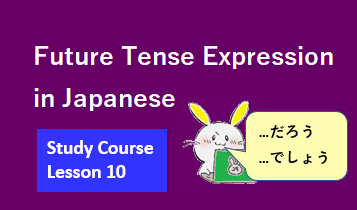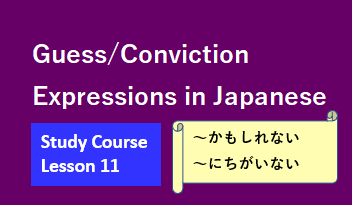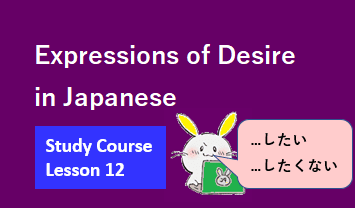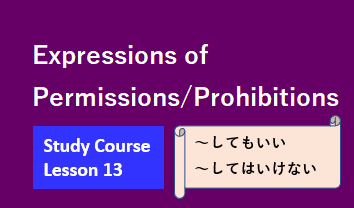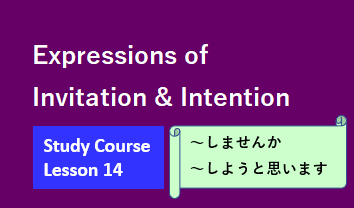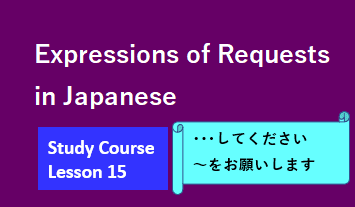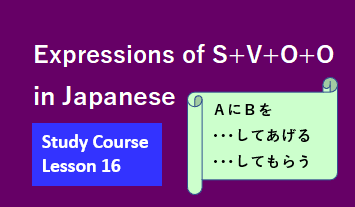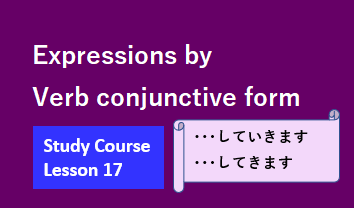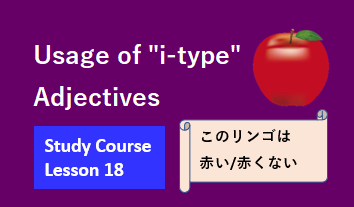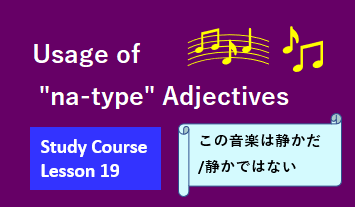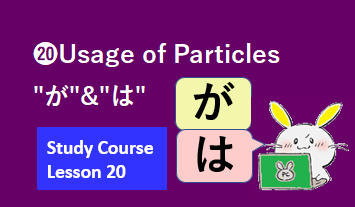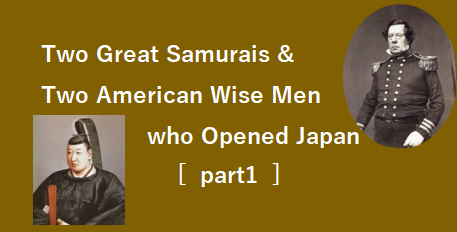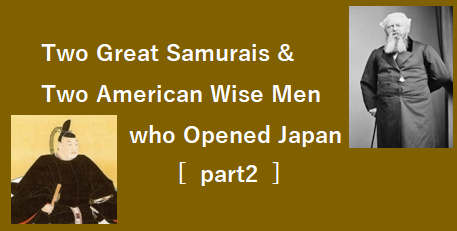Japanese Study Course Lesson6

Hello everyone. I'm JJ. Nice to meet you! Welcome to Japanese Study Course. In lesson 6, we will study present progressive tense and past progressive tense in Japanese. The present progressive tense is a way to express an action, for example, "I'm just doing…"

We have good news for you!
In Ryusho Kanbe's room, we have just introduced the text-to-speech software "Ondoku-san". Please make full use of the Japanese audio and further improve your Japanese language skills.
Created By ondoku3.com
6-1 Present progressive tense
Present progressive tense ➡ " Verb( conjunctive form )+て+いる/います "
- I am watching my favorite TV program.
- Ordinary:私はお気に入りのテレビ番組を見ている。
- Politely:私はお気に入りのテレビ番組を見ています。
- Replacing "いる" with "います" makes it more polite.
- There is another way of expressing it. If you say "私はお気に入りのテレビ番組を見ているところだ。", the meaning is the same, but this expression emphasizes the present progressive tense.
- To put it politely, it's "私はお気に入りのテレビ番組を見ているところです。". Adding the auxiliary verb"です" after the noun "ところ" makes it a more polite expression.
◆Detailed explanation
- Ordinary:私はお気に入りのテレビ番組を見ている。
- Politely:私はお気に入りのテレビ番組を見ています。
- 私(subject)+は(nominative particle)
- +お気に入りの(adjective)+テレビ番組(object)+を(object particle)
- +見(verb "見る", conjunctive form)+て(conjunction particle)
- +いる(auxiliary verb, situation)/ +います(auxiliary verb, polite situation)。
- Ordinary:私はお気に入りのテレビ番組を見ているところだ。
- Politely:私はお気に入りのテレビ番組を見ているところです。
- 私(subject)+は(nominative particle)
- +お気に入りの(adjective)+テレビ番組(object)+を(object particle)
- +見(verb "見る", conjunctive form)+て(conjunction particle)
- +いる(auxiliary verb, adnominal form, situation)+ところ(noun)
- +だ(auxiliary verb, assertion)/ +です(auxiliary verb, polite assertion)。
◆Vocabulary note
| お気に入りの:(adjective) favorite テレビ番組 :(noun) TV program 見る :(verb) watch, look, see ※In Japanese, "watch", "look", and "see" are all expressed as "見る" without any difference in expression. |
◆Advanced Study Conjugation of the verb "見る"(Upper one-step)
| Negative form 見(ない) Auxiliary verb "ない" is added after | 私は自宅でテレビを見ない。 I don't watch TV at home. |
| Consecutive form 見(ます/ました/ません) Auxiliary verb "ます/ました/ません" is added after | 私は毎日、帰宅したらテレビを見ます。 I watch TV every day when I come home. |
| Past tense form 見(た) Auxiliary verb "た" is added after | 私はお気に入りのテレビ番組を見た。 I watched my favorite TV program. |
| Conjunctive form 見(て) Conjunction particle "て" is added after | 私はお気に入りのテレビ番組を見ています。 I am watching my favorite TV program. |
| Basic form 見る | 見る watch, look, see |
| Adnominal form 見る(+noun) Noun is added after | ちょうど今からテレビを見るところです。 I'm about to watch TV right now. |
| Hypothesis form 見れ(ば) Conjunction particle "ば" is added after | 私もそのテレビ番組を見ればよかったね。 I wish I could have watched that TV program too. |
| Imperative form 見ろ The form for giving orders | テレビは宿題が終わってから見ろ! Watch TV after you finish your homework! |
| Intentional form 見よ(う) Auxiliary verb "う" is added after | 明日、お気に入りのテレビ番組を必ず見ようと思う。 I will definitely watch my favorite TV program tomorrow. |
The conjugation of the verb "見る" is called the upper one-step conjugation of the verb because they all include the "i" sound, such as "みない,みます,みる,みれば,みろ".
For the better understanding of our readers, in KANBE Ryusho's room, regarding the case of the upper one-step conjugations, we also set them in the same order of the five-step conjugations.
6-2 Past progressive form
Past progressive tense ➡ " Verb( conjunctive form )+て+いた/いました "
- I was studying Japanese from early morning until noon yesterday.
- Ordinary:私は昨日、早朝から昼まで日本語を勉強していた。
- Politely:私は昨日、早朝から昼まで日本語を勉強していました。
- Replacing "いた" with "いました" makes it more polite.
◆Detailed explanation
- Ordinary:私は昨日、早朝から昼まで日本語を勉強していた。
- Politely:私は昨日、早朝から昼まで日本語を勉強していました。
- 私(subject)+は(nominative particle)
- +昨日(time)、+早朝から昼まで(adverb phrase, time)
- +日本語(object)+を(object particle)
- +勉強し(verb "勉強する", conjunctive form)+て(conjunction particle)
- +いた(auxiliary verb, past progressive tense)/ +いました(auxiliary verb, polite past progressive tense )。
- ※「早朝から昼まで(adverb phrase, time)」➡早朝(noun, time)+から(objective particle, start of range)+昼(noun, time)+まで(objective particle, end of range)
◆Vocabulary note
| 昨日 :(noun) yesterday 早朝 :(noun) early morning 昼 :(noun) noon 勉強する:(verb) study |
◆Advanced Study Conjugation of the verb "勉強する"('sa-line' specific)
| Negative form 勉強し(ない) Auxiliary verb "ない" is added after | あなたはいつも何も勉強しない。 you don't always study anything |
| Consecutive form 勉強し(ます/ました/ません) Auxiliary verb "ます/ました/ません" is added after | 私は毎日、家に帰ったら勉強します。 I study every day when I get home. |
| Past tense form 勉強し(た) Auxiliary verb "た" is added after | 私は昨日、家に帰ったら勉強した。 I studied when I got home yesterday. |
| Conjunctive form 勉強し(て) Conjunction particle "て" is added after | 私は日本語を勉強しています。 I am studying Japanese. 私は昨日、昼まで日本語を勉強していました。 I was studying Japanese until noon yesterday. |
| Basic form 勉強する | 勉強する study |
| Adnominal form 勉強する(+noun) Noun is added after | ちょうど今から日本語を勉強するところです。 I am just starting to study Japanese. |
| Hypothesis form 勉強すれ(ば) Conjunction particle "ば" is added after | 私もテストの前に勉強すればよかったね。 I should have studied before the test too. |
| Imperative form 勉強しろ The form for giving orders | 学校から帰ったらまずは勉強しろ! Study first when you get home from school! |
| Intentional form 勉強しよ(う) Auxiliary verb "う" is added after | 明日のテストに備えて今から勉強しようと思う。 I'm going to study now in preparation for tomorrow's test. |
The conjugation form of the verb "勉強する" takes the unique form of "shi, shi, suru, sure, shiro" like "勉強しない,勉強します,勉強する,勉強すれば,勉強しよう", so it is called the 'sa-line' specific conjugation of verbs. The verbs that express "○○する", such as "勉強する", have the same conjugation.
"いた" is exactly "い"(past tense form of the auxiliary verb"いる") + "た"(auxiliary verb, past tense). These grammatical interpretations are too complex, so we use simple explanations here.
"いました" is exactly "い"(consecutive form of the auxiliary verb"いる") +"まし"(past tense form of the auxiliary verb"ます")+ "た"(auxiliary verb, past tense). These grammatical interpretations are too complex, so we use simple explanations here.
◆Advanced Study Objective particle "から" ➀:start of range
- The objective particle of this usage is used to add immediately after a noun indicating start of range.
- It is used in the form of "noun ( start of range ) + から".
- For example, ’I will be on summer vacation from tomorrow.' 私は明日から夏休みです。
- I was studying Japanese from early morning until noon yesterday. 私は昨日、早朝から昼まで日本語を勉強していました。

◆Advanced Study Objective particle "まで", end of range
- The objective particle of this usage is used to add immediately after a noun indicating end of range.
- It is used in the form of "noun ( end of range ) + まで".
- For example, 'Yesterday was Sunday so I slept until 11am.' 昨日は日曜日だったので午前11時まで寝たよ。
- I was studying Japanese from early morning until noon yesterday. 私は昨日、早朝から昼まで日本語を勉強していました。
◆Advanced Study How to say time in a calendar
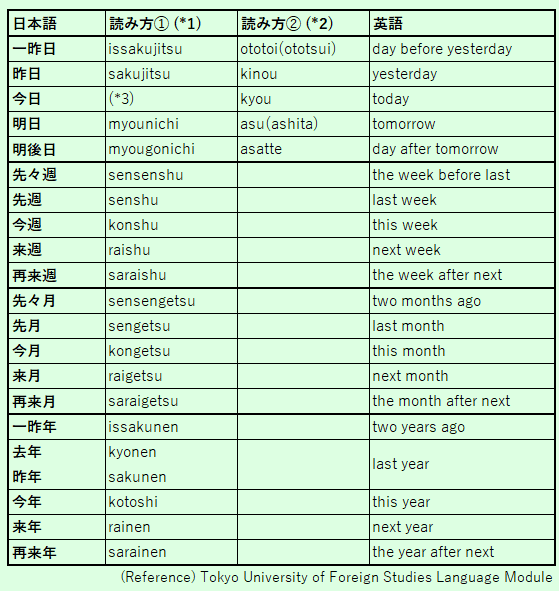
<Note>
- *1:'On-yomi' which is a reading that matches the original sound of the kanji.
- *2:'Kun-yomi' which is a way of reading that is unique to Japanese language and applies it to kanji. These kun readings are often written in hiragana.
- *3:The on-yomi pronunciation of "今日" is "konnichi", but since it has a different meaning, the pronunciation is omitted here.
As for "一昨日, 昨日, 明日, 明後日", the kun-yomi is used in everyday conversation, while the on-yomi is used in formal situations. For those who want to enjoy daily conversations with friends, kun-yomi is enough, but for those who want to use Japanese for business, learning on-yomi is essential.

Today's lesson ends here. Ladies and gentlemen, did you understand today's theme "Present progressive tense and Past progressive tense in Japanese"? Next time, we will learn about a situational form of verbs in detail. See you!
See you next time!






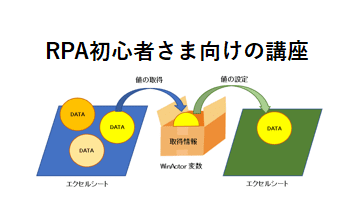


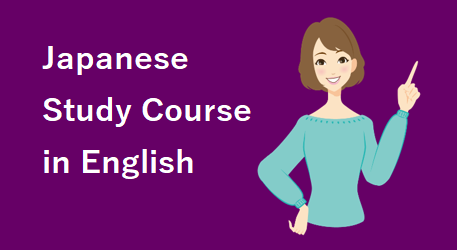


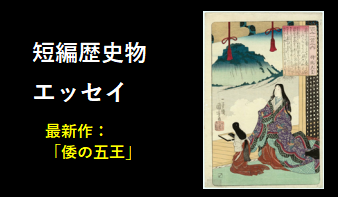
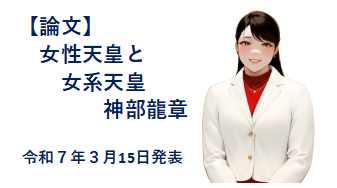

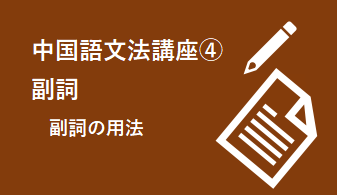
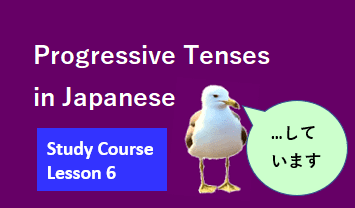


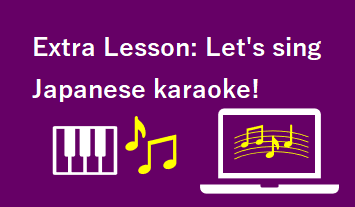
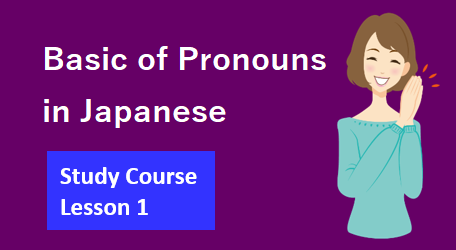
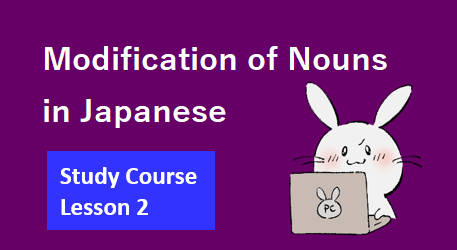

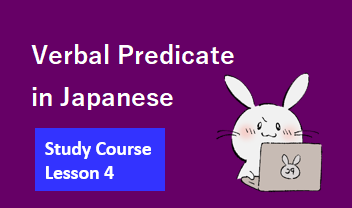
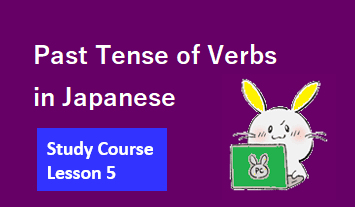
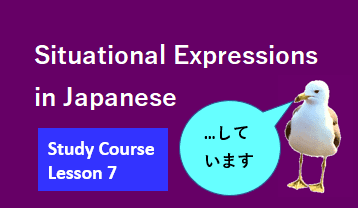
![❽Possible Expressions [1]](https://ryusho-kanbe.com/wp-content/uploads/2023/04/スクリーンショット-2023-04-03-100754.png)
![❾Possible Expressions [2]](https://ryusho-kanbe.com/wp-content/uploads/2023/04/スクリーンショット-2023-04-28-095816.png)
